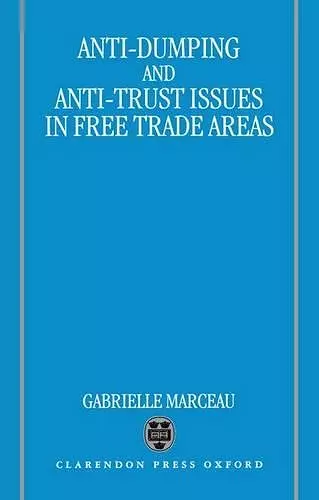Anti-Dumping and Anti-Trust Issues in Free-Trade Areas
Format:Hardback
Publisher:Oxford University Press
Published:15th Dec '94
Currently unavailable, and unfortunately no date known when it will be back

In this book the legitimacy of anti-dumping measures in free trade areas is discussed. Economists argue that, generally, anti-dumping actions restrict and distort competition. In political terms, anti-dumping measures are biased in favour of a privileged interest group: the producers. Legally, they infringe the obligation of National Treatment contained in the GATT and NAFTA. Within regional groupings they contradict the guidelines of Article XXIV(8) (b) of the GATT. At the same time, anti-dumping measures are an exclusive exercise of sovereignty and would seem to protect statehood and arguably other national interests of any importing state. The traditional alternative for anti-dumping actions has always been argued to be the application of domestic legislation against predation and price discrimination. It is suggested that this solution is inappropriate or at least incomplete. Many abuses, other than predation, can be exercised in transnational market: transnational vertical restraints such as tying, refusal to deal, restrictions on patents, trade marks and copyrights may all facilitate dumping. Indeed, in an international forum, what constitute market power and abusive conduct differ from what would otherwise be acceptable in a domestic market. Security and other national policies ought to be weighted against efficiency considerations. In this context, the European framework of analysis, where variables additional to efficiency are balanced in competition assessments, provides a good model for such an international code of competition. Indeed, within a regional economic grouping, interests may be different. Anti-dumping laws may be phased out if states are willing to see national distinction phasing out as well. It is argued in this book that NAFTA can constitute a laboratory for needed discussion on an international code of conduct of firms and governments. It will then be suggested that anti-dumping actions could be phased out within NAFTA only if a comprehensive system of competition laws were to be enforceable against any transnational restrictive business practice. But for all states to agree on such legislation, they must have reached parallel.
'none of the many articles, books and other cited materials offers the one-stop shopping that Marceau's own book contributes to this au courant field of trade and competition law...much of this book remains highly relevant, and it is likely to remain so for many years to come...a useful framework for dialogue between antidumping and antitrust proponents' * The American Journal of International Law *
'timely and wide-ranging book...rich source of ideas and materials both legal and economic...Dr Marceau's clear thinking, lucid prose and wide-ranging research should illuminate policy and practice in the area. Her book is warmly welcome.' * Int.TLR *
'exceptionally clear...It is a detailed, cogent and well-structured work...Although clearly not intended as a practitioner's book, it is nonetheless to be recommended to several groups. The review of the purpose and effect of anti-dumping measures, whilst not original, is the clearest the reviewer has read and the comparative sections of the book relating to both anti-trust and anti-dumping measures may be attractive to academics and practitioners alike. Finally, the book is a welcome addition to the literature for those involved in policy reform to free trade areas, especially for those considering NAFTA.' * International and Comparative Law Quarterly *
ISBN: 9780198259206
Dimensions: 243mm x 161mm x 31mm
Weight: 752g
384 pages